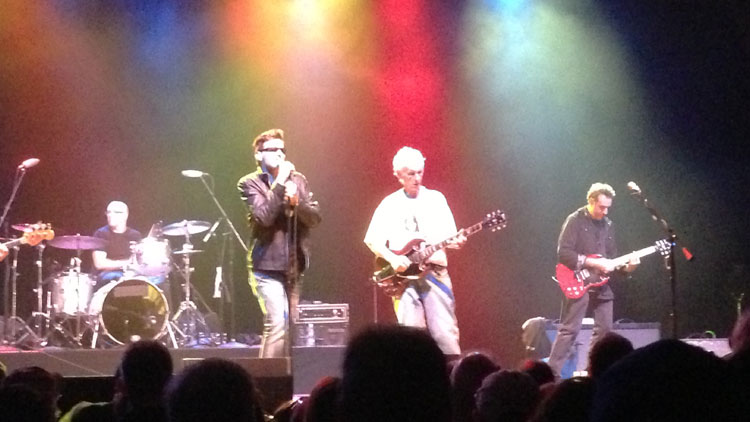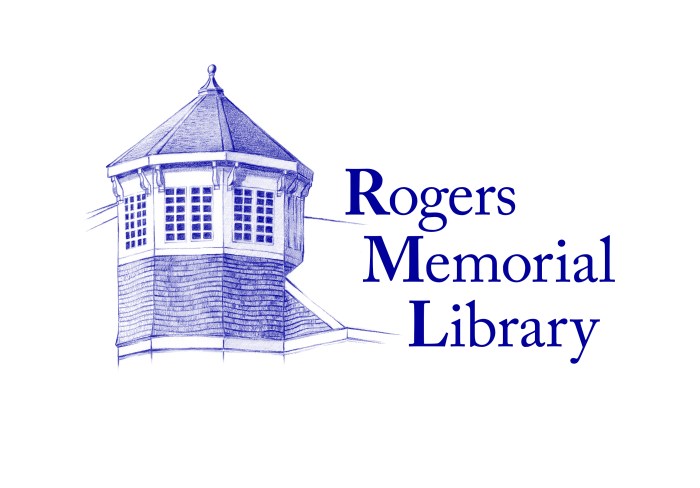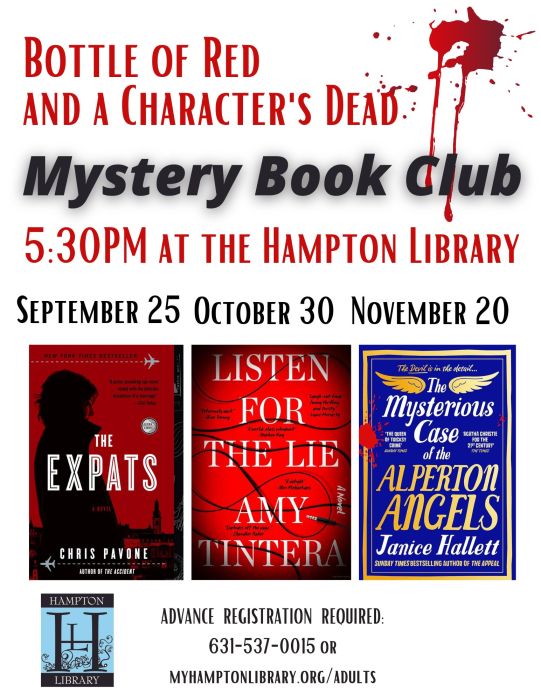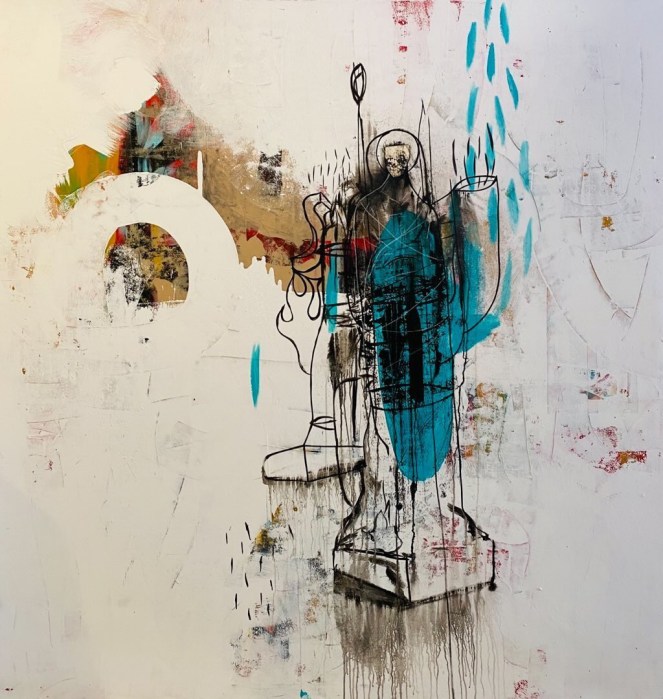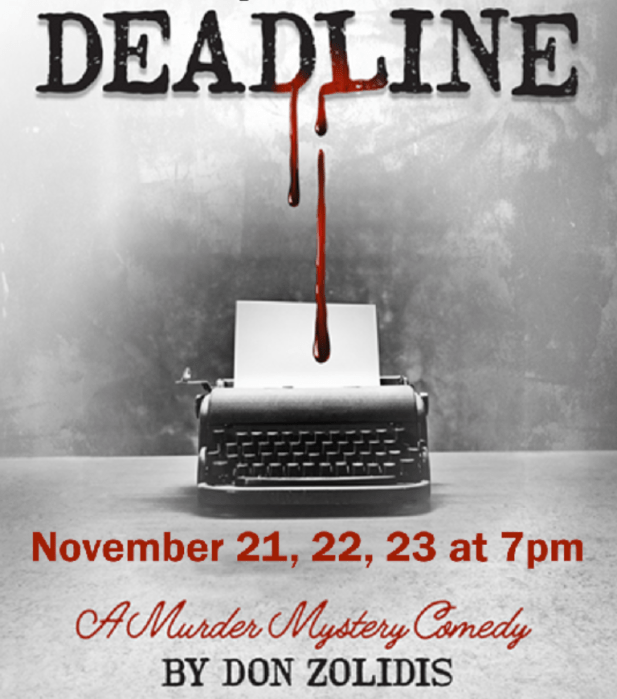His shoulder-length black hair in a tight ponytail, an acoustic guitar strung across his shoulder, and barefoot, singer/guitarist Adam Ezra stood center stage at The Paramount Tuesday night, April 7 and told the packed house that in order to properly do a Boston accent he’d “need to drop a lot of ‘F’-bombs.”
The disclosure was met with cheers—launching him and his band, the Adam Ezra Group, into an electrifying, expletive-saturated performance of their speed-fiddle-soaked “The Devil Came Up To Boston,” a hilarious and catchy take on The Charlie Daniels Band classic “The Devil Went Down To Georgia,” briefly dipping into slivers of fellow Bay Staters Dropkick Murphys’ “Shipping Up To Boston” before wrapping up to resounding applause.
Ezra next hoisted a glass in the air and offered a heartfelt salute to the charged crowd.
“Cheers to you all,” he smiled, gulping its dark contents down. “Cheers.”
The folksy, country-esque, rootsy sextet followed New York City rockers Silverbird as openers for legendary Doors’ guitarist Robby Krieger, and Ezra, switching between guitar, harmonica and banjo for his group’s next two numbers—which also featured his bongo player furiously smashing together two metal garbage can lids—could hardly contain himself. He told the audience he remembered stealing his grandparents’ car back in the day and smoking marijuana with his friend “all night to [The Doors’] ‘Peace Frog’” before he’d even begun to write his own songs, and announced that after his set he’d be in the merchandise section selling CDs and T-shirts. If concertgoers dug his music, Ezra said, they could contribute $10 or $5 to an “I Love You Box” for a disc, or even enjoy an album for free if they didn’t have the cash.
Also sharing that the band had suffered a flat tire on the way to the gig, it was apparent this guy had a lotta heart [he and his band played with a lotta heart, too], and by the time the house lights dimmed for headliner Krieger at around 9:45 p.m., dozens had visited Ezra at the band’s merch station for autographs, photos and CDs.
Billed as “An Evening of The Doors Greatest Hits” with Krieger’s son Waylon contributing guest vocals, the Rock and Roll Hall of Famer did not disappoint, along with keyboardist Nathan Wilmarth, bassist Phil Chen and drummer Ty Dennis, delivering a powerful, tight set of songs spanning the iconic group’s six studio albums with late vocalist Jim Morrison, who died in 1971 from a supposed heroin overdose at 27.
Krieger, at 70 years old, absolutely owned the night.
Wearing an oversized hockey jersey, riffing on his signature Gibson SGs and lending backing vocals on several tunes, his performance proved that he’s not only still got it, but that the guitar masterwork that has earned him a ranking on Rolling Stone’s List of the 100 Greatest Guitarists Of All Time and catapulted The Doors to rock mega-stardom has only refined with age.
Krieger commanded his instrument with the same passion and virtuosity one would expect from someone who’s been opening interdimensional, genre-shattering portals with a six-string for more than 50 years, first experimenting in flamenco, blues, folk and jazz in high school before teaming up with keyboardist Ray Manzarek, drummer John Densmore and Morrison in 1965, and after the latter’s death, continuing with its remaining members before launching a solo career, a jam band Jam Kitchen—with his son Waylon on guitar and vocals—and then returning to The Doors’ music with Manzarek for more than a decade until the keyboardist’s death in May 2013. That incarnation featured a revolving cast of singers and musicians, including for a time Ian Astbury of The Cult filling in for Morrison and Stewart Copeland of The Police on skins.
In a recent interview with StarPulse.com, Krieger said he hadn’t played Doors tunes since the passing of Manzarek in 2013, but recently returned to the catalog when his son Waylon (who’s also a guitarist) “took an interest in singing and got me motivated to fill that gap and play Doors music again.”
Lucky for us.
Krieger summoned a kaleidoscopic cacophony of noise and laser-guided notes that sparkled with life, gliding and dancing through the air, veering into total chaos at times, and always looping back into perfect cadence with the killer rhythm and virtuosic keys. An arsenal of pedals at his feet transformed his licks into otherworldly meteors of droning, mind-bending going-to-ravage-the-Earth dissonance or straight-up whiskey-drenched jazz-blues. Supersaturated in echo and reverb, some notes lingered like ghosts, wandering among those dancing along on the Paramount’s floor and mixing with the faint wafting scent of marijuana before drifting off into the netherworld he conjured, while others glimmered and leapt from his amplifier like the simmering ashes of a Native American ceremonial funeral pyre.
Late Doors singer Jim Morrison may have been the Rimbaud-manchild shaman of the supergroup, but it was Krieger, Manzarek and Densmore’s eclectic fluidity that both provided a foundation for Morrison’s mad poetry, accentuating and anchoring his visions through a magical cohesion at once horrifically dark, sinister, healing and infectious, thus redefining rock and roll along the way.
Krieger was also a chief songwriter of the group, penning or co-writing some of the mega-hits that launched the four musicians from gigging shitty bars in L.A. to their ascension as one of the most important rock bands that have ever existed. Among those: “Light My Fire,” Touch Me,” “Love Me Two Times” and “Love Her Madly”—the latter containing lyrics inspired by his then-girlfriend, now-wife of 42 years, Lynn, he told the howling audience.
When she’d get mad with him (which was often, Krieger joked), she’d run out on him, slamming the door of wherever they were at the time as she fled. Thus the line: “Don’t you love her as she’s running out the door,” he laughed.
The band started Tuesday’s show with rousing versions of “Break On Through (To The Other Side)” and “Alabama Song (Whiskey Bar),” to jubilant cheers.
With a slick, short haircut and sporting a black leather jacket, dark sunglasses and Batman T-shirt instead of Morrison’s trademark skintight leather pants and shaggy, Adonis-like mane, Waylon was no Lizard King, but held his own throughout the more than two-hour set. The fact it was Krieger’s son singing—and thus, a father-son team—nullifies any ill-will from my Doors-purist self to crucify him as a wanna-be MoJo Rising-karaoke freak who lacked the latter’s stage presence, passion and antics (No One Can Fill Morrison’s shoes–let me repeat that: NO ONE), emotion, fury, destruction and force, missed a few notes, perhaps even jumbled a verse or two, and even if he wasn’t trying to imitate Jimbo at all, perhaps came off a wee-bit so, though honestly, there was a certain magic cast that night through that generational performance. At one point, about mid-set, they gelled and sounded so well that if you closed your eyes you could imagine yourself being back at an original Doors gig. Well, a little bit, anyway. A smidgen, perhaps? I know, I know. Wow, Tirana. Wowww. What the hell is this Tirana guy spewing? As elusive Press food critic Chris Cooke used to state, “I write it like I eat it,” so too will this humble music critic profess: “I write it like I hear it.” So as Morrison infamously told the cop who maced him before taking the stage at the legendary New Haven Arena gig in 1967: “Eat it.”
“‘Wait what was that?'” you ask. “‘Did he just–no, no he did not. The music writer did not just tell me to–this is unreal!'”
It’s called rock and fkn roll, and this is a Robby Krieger show, people. Robby fkn Krieger! And his son! Doin’ Doors songs!
The band next unleashed a ferocious “Back Door Man,” again garnering massive applause from the audience, with Krieger introducing Wilmarth afterward as “a keyboard collector” who’s “got all of Ray Manzarek’s keyboards.”
Krieger next whipped out his legendary slide for a stirring rendition of “Moonlight Drive,” reciting the lines to “Horse Latitudes” at its close, while simultaneously climbing up and down his SG’s neck to create the frightening effects of a horse drowning at sea. Without but a millisecond of a pause, the house lights dimmed into the mean, gritty opening riff of “Wild Child,” his son adding a “Yeah! C’mon!” as the band kicked in.
Next came the epic “When The Music’s Over,” punctuated by Krieger striking, then down-tuning, the low-E string, and slowly tightening it again and again several times to milk the song’s infamously defining sonic moan that somehow mimicked the ghastly, otherworldly bellow of a downed airplane as it plummets and careens across an ocean of distortion before leveling off, then spiraling downward again.
“Quiet!” shouted Waylon in an ill-fated attempt to get the crowd to simmer for the band’s buildup kick-back-in at the end—which featured his father just ripping like a madman across his frets during an extended finger-tapping session.
“Any suggestions?” he asked afterward, to a deafening assault of song names. [I personally wanted to hear “Love Street,” “The Crystal Ship,” “Indian Summer” or “The Unknown Soldier,” but being far back from the stage with one of my brothers and sisters keeping a buddy with flatfeet company on the steps of the back riser, I happily immersed myself in one of my $14 Blue Point Toasted Lagers instead. “To Jim,” I thought. “To Jim and Ray.”]
Radio go-to “People Are Strange” won out, followed by demands for “Peace Frog!” to which Waylon asked: “Do we have any psychics in the house?” and explaining that was the next number on their set list.
“The problem with Doors songs is that there’s too many good songs,” joked his father. “Can’t do ’em all. But we can do ‘Peace Frog.’”
It was tight, loud and fantastic, and many in the packed hall danced along.
The group then launched into an energetic rendition of “Love Me Two Times”—with Waylon getting jammed up on a line or two while his dad dueled off trading licks for a bit with Wilmarth.
The crowd went wild.
Waylon then announced to the screaming crowd it was “The Special-Treat Portion of the Show,” and his father traded his SG for a classical acoustic and removed his jersey to reveal a white T-shirt with the iconic “Young Lion” Morrison across its front, tossing a pick out to the screaming crowd.
“Back in the day, when we did ‘Spanish Caravan,’ I did this cool solo thing in the middle of the song but they cut it out for some reason,” he explained. “It was really cool. Ended up on the cutting room floor, so I figured I’ll do it now.”
For the next five minutes, Krieger’s fingers methodically picked, plucked and brushed his strings, weaving a multi-tiered tapestry onto the canvas of the night, pacing back and forth across the stage and periodically pausing several times at its edge before a sea of adoring fans and chants.
Then came those all-familiar descending notes—guitar, organ and drums, falling, falling, falling, then just cascading beneath rabid torrents of crashes.
Wild. Explosive. Gorgeous. Dennis became a human machine gun.
“Every time we play this song, it rains, so—” Krieger said afterwards, with the band kicking into the popular thunderstorm-drenched “Riders On The Storm.”
Sick.
Then came “Love Her Madly,” the father-son duo recalling the aforementioned history of the tune—the elder referring to his now-wife as his “girlfriend at the time.”
“She’s still my mom,” joked Waylon.
“She’s still my wife,” replied his dad, admitting that he “Kind of stole” the song’s title from Duke Ellington.
Next came the bluesy “Maggie McGill,” from 1970’s Morrison Hotel.
“Illegitimate son of a rock and roll star,” boomed Waylon. “I’ve been singing the blues ever since the world began.”
“Not sure if it was the 14 dollar drinks of just yearning wishful hallucinations but arnd this time just seemed to fkn gel,” read my scribbled notes from that moment. “Pple dancing. Tight. Everyone in the groove.”
Damn that was a hot one lol.
So was its follow-up: an insane jam-out rock-out mondo-mega “L.A. Woman.”
“We need some help here, so help me out,” Waylon muttered to the crowd during the mid-song slowdown, dangling the mic chord as if a swinging pendulum. “This is what’s called your audience fkn participation. You guys, at The Paramount—this is the best fkn crowd on the whole fkn tour. I ain’t just saying that. Cause sometimes we lie. Sometimes we lie. We’re not lying right now. You guys are the shtt. So help me out with this next part, yeah? All right.
“Mis-ter Mo-Jo Rising,” he and the audience sang along together.
The band left the stage to roaring cheers and applause. Pretty much everybody in the house was up on their feet shufflin’ and movin’ to the tunes at this point, and they demanded more.
“You’re a tough crowd,” said Waylon as the group re-emerged for an encore, beginning with a rabid version of “Not To Touch The Earth,” into “Soul Kitchen.”
“We have time for one short song,” announced Krieger around midnight, above the roars of the still-hopped-up crowd. “So we’ll do a long one.”
The whole place danced along to an insane, extended “Light My Fire,” with Waylon leaving the stage for some of it and each musician just flat-out killing it on extra-long solos and jam-outs.
“Let’s hear it for Ray, c’mon,” implored Krieger, inciting even more howls from the audience.
His solo was nothing short of crushingly devastating, mixing discernable portions of the Beatles’ “Eleanor Rigby” and John Coltrane’s “My Favorite Things” within the controlled chaos of this beautiful beast.
Krieger re-introduced the band members following equally killer bass and drum solos before wrapping up this epic, the house lights back on, the crowd still roaring, and (if I remember correctly), Creedence Clearwater Revival pouring out of the house PA as we all spilled out onto New York Avenue.
“He absolutely owned it,” read my notes. “The songs… The nite.”
The Adam Ezra Group will be returning to The Paramount on June 5 with Rusted Root and The Wailers. For more information go to paramountny.com.



